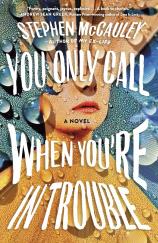Reading Group Guide
Discussion Questions
You Only Call When You're in Trouble

Please note: In order to provide book clubs with the most informed and thought-provoking questions possible, it is necessary to reveal aspects of the story, as well as the ending. If you have not finished reading YOU ONLY CALL WHEN YOU'RE IN TROUBLE, you may want to wait before reviewing this guide.
1. Do you have someone in your life who only calls you when they’re in trouble? Is there someone you call only in moments of distress? How have these relationships impacted your life?
2. “When Neeta spoke about Cecily’s childhood and family, she always seemed to be speaking about the absence of a father. That was what Cecily heard, anyway.” How do Cecily’s insecurities about her own family structure inform her interactions with people outside of her family? Would you consider any of the families in the novel to be healthy, functional families? Why or why not?
3. How do Cecily, Dorothy and Tom’s career trajectories shape their actions? What kind of role do you think people’s careers should play in their lives?
4. How are age and aging addressed in the novel? In what ways are modern-day Tom and Dorothy different from the versions of themselves represented in flashbacks? In what ways are they the same?
5. As an architect specializing in tiny homes, Tom spends a lot of time thinking about space. What kind of space does Tom take up in the makeup of his family? In his job? In his personal life? Do you think some family members take up more space in the novel? If so, who?
6. As the perspectives rotate in YOU ONLY CALL WHEN YOU'RE IN TROUBLE, readers see the same relationships and events interpreted from different points of view. How do the ways in which the different characters view each other differ from the ways they view themselves? How do they differ from the ways you, as a reader, see the different characters?
7. Consider the following passage from Tom’s perspective on page 46:
“On the whole, he was suspicious of people who placed excessive importance on family connections and the disturbing notion of ‘blood.’ Like religious beliefs, these ideas were often presented as the source of empathy, love, and generosity, but were more often used as excuses for doling those things out selectively. And yet, what he felt toward Cecily was inseparable from the fact that she was his sister’s child, a status that gave him some claim to her.”
How are familial ties different from those of other non-familial relationships? How are they similar? Does the status of ‘family member’ require a specific kind of love and attention?
8. Dorothy has kept the identity of Cecily’s father a secret for decades. Do you think her motives were good in doing so? Are secrets ever necessary? Has a familial secret ever been revealed in your own life? If so, what was that experience like?
9. While Cecily isn’t guilty of all the charges against her, she does feel responsible for many of the misunderstandings with Lee. Do you think she’s right? Was there anything Cecily could have done differently to prevent the situation? Have you ever unintentionally led someone on because it was too awkward to confront them?
10. In the final chapters of the novel, Tom decides not to tell Cecily about Dorothy’s stroke as she is leaving for California. Why does he make this decision? Do you think he would have made the same decision at the beginning of the novel? How do you imagine Cecily will react when she finds out what has happened?
11. Was Cecily’s decision to skip her meeting about the outcome of her case at Deerpath an act of self-sabotage or a positive move toward self-determination? Was this the ending for Cecily you anticipated? If yes, why? If no, why not?
You Only Call When You're in Trouble
- Publication Date: January 7, 2025
- Genres: Fiction
- Paperback: 336 pages
- Publisher: Holt Paperbacks
- ISBN-10: 1250296811
- ISBN-13: 9781250296818







